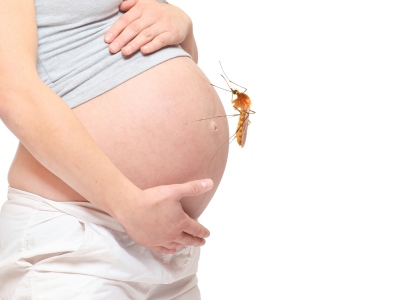
Zika and Pregnancy, What Women Need to Know
Measures for Addressing Expecting Mothers with Zika Concerns
You can’t walk by a newspaper or turn on your television without hearing about Zika. National Geographic has called Zika “this year’s scary virus” (Quammen, 2016). With the most recent occurrences of Zika virus in the United States, many pregnant women, or those planning to become pregnant are seeking guidance from healthcare providers. Of most concern is how the Zika virus may affect them and their unborn child and/or how to prevent contracting the virus.
Zika virus symptoms include fever, maculopapular rash, joint pain, conjunctivitis (red eyes), muscle pain & headache (Center for Disease Control and Prevention [CDC], 2016a). Symptoms from Zika are usually mild and last for several days to a week (CDC, 2016a). Anyone who lives or travels to an area where the Zika virus is vulnerable to infection from mosquito bites (CDC, 2016b). Zika can also be transmitted through sexual intercourse and a woman infected with Zika may pass the virus to her fetus (CDC, 2016b). Currently, there is no vaccine or specific medications for Zika (CDC, 2016c). Treatment is usually supportive including rest, fluids, and the use of analgesics and antipyretics (CDC, 2016d).
Zika infection has been associated with birth defects during any trimester of pregnancy, specifically microcephaly (American College of Obstetricians and Gynecologists [ACOG], 2016 & CDC, 2016e). Microcephaly is diagnosed when a baby’s head is smaller than expected, compared to babies of the same size and age (CDC 2016e & March of Dimes, 2016). However, not every baby whose mother has a Zika infection is born with microcephaly (CDC, 2016e & March of Dimes, 2016). Other birth defects such as hearing loss, eye deformities, and vision problems, growth problems in the womb, miscarriage, and stillbirth have also been related to Zika infection during pregnancy (CDC, 2016e & March of Dimes, 2016).
If a pregnant woman presents with symptoms, an evaluation of the fetus for potential infection must be completed regardless of maternal symptoms or testing results (ACOG, 2016). For any woman who tests positive for Zika, CDC recommends following the growth and development of the baby during pregnancy. Following the baby’s growth includes frequent ultrasounds and other lab tests to determine if there are signs of Zika infection in the baby (Fleming, et.al, 2016). To date, there are no reports of infants contracting Zika through breastfeeding. Mothers are encouraged to breastfeed even in areas where Zika virus is found because of the benefits of breastfeeding (ACOG 2016 & CDC, 2016b).
Additionally, avoiding exposure is the best guidance for women who are pregnant or planning to get pregnant. CDC recommends all pregnant women, women planning to become pregnant & their partners postpone travel to areas where there are active Zika Virus outbreaks (CDC, 2016e). If travel to areas where Zika is reported is unavoidable, precautions to avoid mosquito bites need to be taken, including the use of EPA- approved bug spray with DEET, covering exposed skin, staying in air-conditioned or screened-in areas, and treating clothing with permethrin (ACOG, 2016). If a pregnant woman has a partner who lives in or has traveled to an area with Zika, she should be counseled to either use barrier methods to prevent sexual transmission, such as condoms--correctly and consistently every time she has sex--or abstains from sex for the duration of her pregnancy (CDC 2016e).
Many questions still remain regarding the Zika virus and the spectrum of pregnancy and neonatal outcomes associated with Zika virus infection. As more information becomes available, the CDC website is a great resource to obtain the latest information.
For more information on protecting yourself and your patients from Zika Virus take our RN.com course Zika: What We Know So Far.
References
American College of Obstetricians and Gynecologists (ACOG, 2016). Practice Advisory: Interim Guidance for Care of Obstetric Patients During a Zika Outbreak.
Center for Disease Control and Prevention (CDC)(2016a). Symptoms.
Center for Disease Control and Prevention (CDC)(2016b). Transmission & Risks.
Center for Disease Control and Prevention (CDC)(2016c). About Zika.
Center for Disease Control and Prevention (CDC)(2016d).Treatment .
Center for Disease Control and Prevention (CDC)(2016e).Health Effects & Risks.
Center for Disease Control and Prevention (CDC)(2016d).Clinical Evaluation & Disease .
Center for Disease Control and Prevention (CDC)(2016e).Zika & Pregnancy .
Fleming-Dutra, K, Nelson, J., Fischer, M., Staples, E., Karwowski, M.P., Mead, P, Viillanueva, J., Renquist, C.M., Minta, A.A., Jamieson, D.J., Honein, M.A., Moore, C.M., Rasmussen, S.A. (2016) Update: interm guidelines for health care providers for infants and children with possible zika virus infection-united states, february 2016. Morbidity and Mortality Weekly Report (MMWR) 65 (7); 182-187.
March of Dimes (2016). Zika Virus and Pregnancy.
Quammen, David (2016) Why Zika Is This Year’s Scary Virus.




